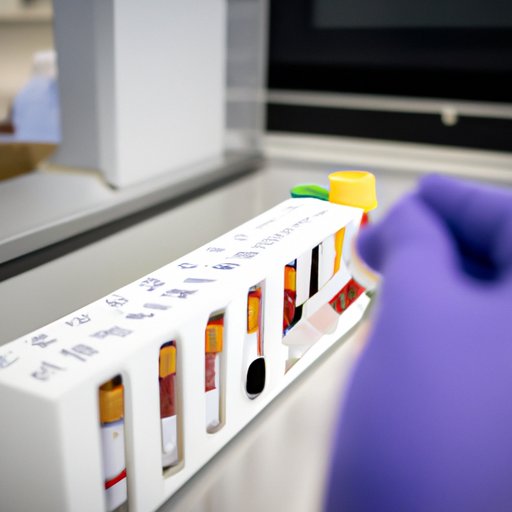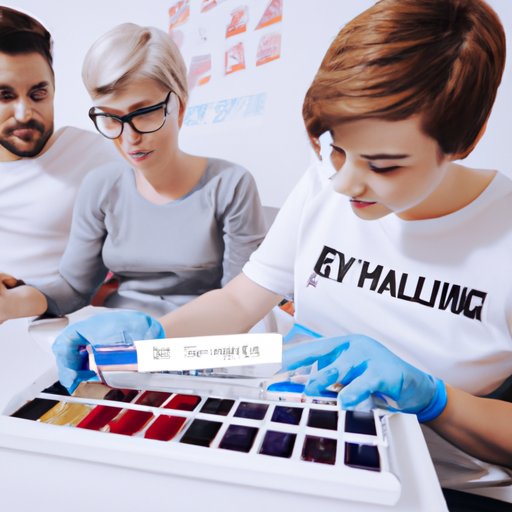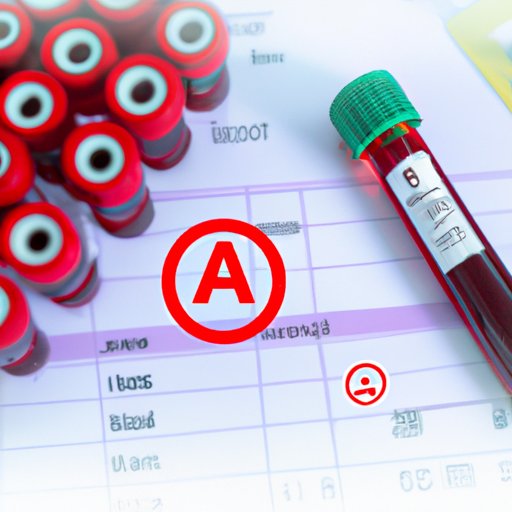Introduction
Blood typing is a laboratory test used to identify a person’s blood type. It is important to know one’s own blood type for medical reasons, such as during a medical emergency or before undergoing surgery or a transfusion. This article will provide an overview of the different tests available to determine a person’s blood type, as well as the benefits and uses of knowing one’s blood type. Additionally, it will explore the different types of blood and their antigens, and provide advice on how to consult with a medical professional to find out one’s blood type.
Discussing the Different Tests Available to Determine Blood Type
The three main tests available to determine a person’s blood type are the blood group test, the antibody screening test, and the cross-matching test. The blood group test is the most commonly used test and involves mixing the patient’s red blood cells with antibodies known to react with certain blood types. If the patient’s blood reacts with a particular antibody, then this indicates that the patient has that particular blood type. The antibody screening test is used to detect the presence of unexpected antibodies in the patient’s blood. Lastly, the cross-matching test is used to determine if a donor’s blood is compatible with the recipient’s blood.

Exploring the Benefits of Knowing Your Blood Type
Knowing one’s blood type is important for a variety of reasons. In the event of a medical emergency, it can be helpful to know one’s blood type so that medical personnel can quickly determine what type of blood should be given to the patient. Before undergoing surgery, it is important to know one’s blood type so that the correct type of blood can be used in the event of a transfusion. Additionally, some medications may be more effective depending on one’s blood type, so it can be beneficial to know one’s blood type before taking certain medications.

Visiting a Laboratory to Get Tested
In order to get tested for one’s blood type, it is necessary to visit a laboratory. Before visiting the laboratory, it is important to prepare by bringing all relevant medical records and any other information that may be required. During the test, a sample of the patient’s blood will be taken and sent to the laboratory for analysis. Once the results are available, they will be communicated to the patient. After the test, it is important to follow up with the doctor or laboratory technician if there are any questions or concerns.
Exploring the Different Types of Blood and Their Antigens
The two main types of blood are the ABO blood group system and the Rh blood group system. The ABO blood group system is based on the presence or absence of antigens on the surface of the red blood cells. These antigens are labeled A, B, or both. The Rh blood group system is based on the presence or absence of a protein called the Rh factor. People who have this protein are referred to as Rh positive, while those who do not are referred to as Rh negative.
Consulting With a Medical Professional to Find Out Your Blood Type
If a person would like to find out their blood type but does not want to visit a laboratory, they can consult with a medical professional. It is important to talk to a qualified doctor or nurse who is knowledgeable about blood type testing. When consulting with a medical professional, it is important to ask questions such as “What type of test do I need?” and “What is the cost of the test?” Additionally, it is important to make sure that the medical professional is certified to perform the test and that they have the appropriate equipment.

Exploring the Different Uses of Blood Typing
Blood typing is used for a variety of purposes, including incompatible transfusions, disease prevention, and paternity testing. Incompatible transfusions occur when a person receives blood from a donor whose blood type is not compatible with their own. This can lead to serious health complications, so it is important to know one’s own blood type in order to avoid this situation. Disease prevention is another use of blood typing. Certain diseases, such as sickle cell anemia, are more common in people with certain blood types, so knowing one’s own blood type can help prevent the spread of these diseases. Finally, blood typing is used in paternity testing to determine if a child’s father is the biological father.
Conclusion
In conclusion, it is important to know one’s own blood type for a variety of reasons. There are several tests available to determine one’s blood type, and it is also possible to consult with a medical professional to find out one’s blood type. Additionally, there are many uses for blood typing, such as incompatible transfusions, disease prevention, and paternity testing. Knowing one’s own blood type can be beneficial in a variety of situations, so it is important to take the time to find out one’s blood type.
(Note: Is this article not meeting your expectations? Do you have knowledge or insights to share? Unlock new opportunities and expand your reach by joining our authors team. Click Registration to join us and share your expertise with our readers.)
